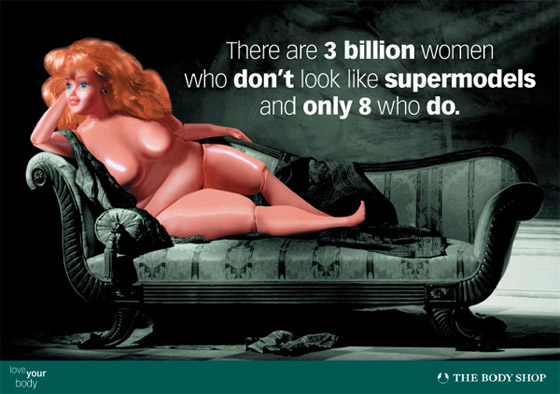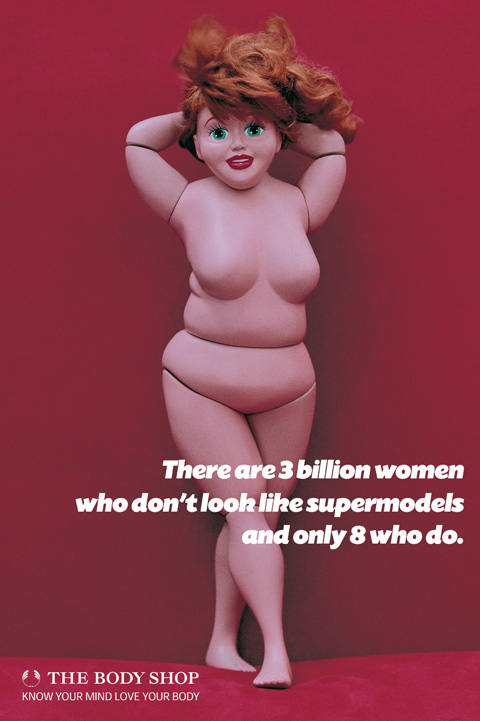
Ah, Ruby, you nipless plump anti-Barbie. It's been in every Body Shop window since 1998. First you tick off Mattel, and now you're banned from the Hong Kong rail system. Something about pubic hair & nipples. Or the distinct lack of either. (No, this isn't a banned ad per se, it's just refused from certain media venues, but the Hong Kong transit system is large enough to count for a sorta-ban).
Anti Roddick says it best;
In 1998, The Body Shop debuted its self-esteem campaign, featuring the generously proportioned doll we dubbed "Ruby." Her rubenesque figure graced windows in The Body Shop windows in the UK that year, along with our slogan, "There are 3 billion women who don't look like supermodels and only 8 who do." She went on to appear in stores in Australia, Asia, and the United States, where she captured the imaginations of consumers weary of the rail-thin heroin-chic of the beauty industry's advertising messages.
Ruby was a fun idea, but she carried a serious message. She was intended to challenge stereotypes of beauty and counter the pervasive influence of the cosmetics industry, of which we understood we were a part. Perhaps more than we had even hoped, Ruby kick-started a worldwide debate about body image and self-esteem.
But Ruby was not universally loved. In the United States, the toy company Mattel sent us a cease-and-desist order, demanding we pull the images of Ruby from American shop windows. Their reason: Ruby was making Barbie look bad, presumably by mocking the plastic twig-like bestseller (Barbie dolls sell at a rate of two per second; it's hard to see how our Ruby could have done any meaningful damage.) I was ecstatic that Mattel thought Ruby was insulting to Barbie -- the idea of one inanimate piece of molded plastic hurting another's feelings was absolutely mind-blowing.
Then, in Hong Kong, posters of Ruby were banned on the Mass Transit Railway because authorities said she would offend passengers. (Granted, Ruby often appeared without clothes on, but like Barbie, she had no nipples or pubic hair.) Of course, the much more seriously offensive images of silicone-enhanced blondes in other ads were permitted to stay on the trains.
And there, in a nutshell, is my relationship with the beauty industry. It makes me angry, not only because it is a male-dominated industry built on creating needs that don't exist, but because it seems to have decided that it needs to make women unhappy about their appearances. It plays on self-doubt and insecurity about image and ageing by projecting impossible ideals of youth and beauty.
Leonard Lauder, son of Estée, once refused to advertise in Ms. Magazine (back when they still accepted ads) because, he said his products were meant for "the kept woman mentality."

